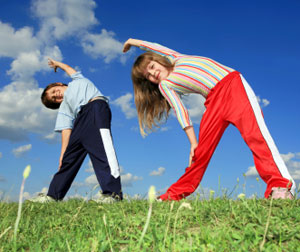If there were a way to make your child a better reader, or improve their performance in math – and it was free, natural and absolutely safe – would you do it? Of course you would!
Virtually every parent hopes their child will excel academically, and for kids the boost to reading and math skills can be a tremendous lift to their self-esteem. Fortunately, yet another study has found that getting physically fit has the wonderful “side effect” of boosting your child's cognitive abilities – no tutor required!
HEALTHY HEART AND LUNGS BOOST MATH AND READING SCORES
According to a study done at the University of North Texas, having a healthy heart and lungs may be one of the most important factors for middle school students to excel in math and reading.
Cardiorespiratory fitness was the only factor that was found to consistently impact grades on reading and math tests, which the researchers said should be a wake-up call to schools that have limited physical education classes. Of course, you needn't rely on gym class to get your child active, and in fact should strive to make physical fitness a regular part of your family's life outside of school hours as well.
THE MORE ACTIVE YOUR CHILD, THE BETTER THEY'LL DO AT SCHOOL
This was the finding from a review of 14 studies involving children ages 6-18.2 According to the authors:
“There are several hypothesized mechanisms for why exercise is beneficial for cognition, including:
- Increased blood and oxygen flow to the brain
- Increased levels of norepinephrine and endorphins resulting in a reduction of stress and an improvement of mood
- Increased growth factors that help to create new nerve cells and support synaptic plasticity”
To put this into perspective, Naperville Central High School in Illinois implemented a special program where students could take part in a dynamic gym class at the beginning of the day and had access to exercise bikes and balls throughout the day in their classrooms. The results were astounding. Those who participated nearly doubled their reading scores, and math scores increased 20-fold!
As many of you reading this have likely experienced, if your mind is feeling cluttered or you're having a mid-afternoon slump, a brisk walk or a quick workout can give you a renewed sense of clarity and focus. This is certainly true for kids too. The research is pouring in that regular exercise can improve test scores, IQ levels and task efficiency for kids and adults alike. Some of the research highlights include:
- Among elementary school students, 40 minutes of daily exercise increased IQ by an average of nearly 4 points
- Among 6th graders, the fittest students scored 30 percent higher than average students, and the less fit students scored 20 percent lower
- Among older students, those who play vigorous sports have a 20 percent improvement in Math, Science, English and Social Studies
- Fit 18-year-olds are more likely to go on to higher education and get full-time jobs
- Students who exercise before class improved test scores 17 percent, and those who worked out for 40 minutes improved an entire letter grade
WHAT TYPE OF EXERCISE IS BEST FOR KIDS?
The same type that's best for adults, which is short bursts of intense activity with periods of rest in between— this is actually the way your body was designed to move! And kids will typically fall into this behavior quite spontaneously, as long as they're outdoors with friends, and not cooped up in front of a TV or computer screen … Like adults, kids also need variety in their exercise routines to reap the greatest rewards, so be sure your child is getting:
- Interval training
- Strength training
- Stretching
- Core-building activities
This may sound daunting, but if your child participates in a gymnastics class, sprints around the backyard after the dog often and rides his bike after school, he or she's covered.
Also remember that acting as a role model by staying active yourself is one of the best ways to motivate and inspire your kids. If your child sees you embracing exercise as a positive and important part of your lifestyle, they will naturally follow suit. Plus, it's easy to plan active activities that involve the whole family and double up as fun ways to spend time together, like hiking, bike riding, canoeing, swimming and sports.



